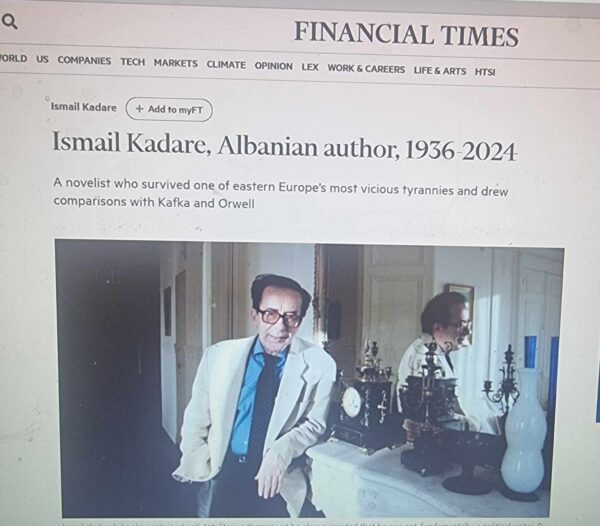Financial Times/Ismail Kadare, Albanian author, 1936-2024
Roula Khalaf, Editor of the FT, selects her favourite stories in this weekly newsletter.
A novelist who survived one of eastern Europe’s most vicious tyrannies and drew comparisons with Kafka and Orwell.

Aged 35, Ismail Kadare was summoned in March 1971 to a private meeting with Enver Hoxha, Albania’s fearsome communist dictator. With a well-deserved reputation for murdering and imprisoning critics real and imagined, Hoxha had received word — perhaps from his Sigurimi security police — that Kadare planned to write a novel about the breakdown of Albanian-Soviet relations after Joseph Stalin’s death in 1953. Kadare, regarded as Albania’s most accomplished living author, had never met Hoxha, who had ruled since 1944, and was never to meet him again. But even as one of eastern Europe’s most imaginative fiction writers, sometimes compared to Franz Kafka and George Orwell, he could not have predicted Hoxha’s behaviour on that evening. “Not a single political slogan came out of his mouth during the three hours I was there with him,” Kadare, who has died at the age of 88, recalled in a 1998 interview. “When I left, he gave me some books as a present — a copy of Zacharie Mayani’s book on the origins of the Albanian language and the complete works of Balzac.” Kadare’s ambiguous relationship with Hoxha and his regime, the most vicious and reclusive communist system in eastern Europe, prompted some writers to accuse him of lacking the bravery and integrity of dissident authors such as Václav Havel and Alexander Solzhenitsyn. Kadare rejected the charge, telling the French newspaper Le Monde in 2001: “Basically, what people ask me is how did I get out of the system alive? But you could have been shot for the tiniest things, so why should I have sacrificed myself?” The lives of Kadare and Hoxha intersected in numerous ways. Both were born in the hilly southern town of Gjirokastër. Indeed, their families lived opposite each other on a street called Mad Men’s Alley. But whereas Hoxha (1908-85) studied and worked in France and Belgium before becoming Albania’s communist party leader during the second world war, Kadare, born in 1936, went in the 1950s to Moscow to study literature on a government scholarship. Kadare was no apologist for communism. But he enjoyed privileges as a result of the international fame he acquired after his first novel, The General of the Dead Army, appeared in 1970 in a French translation. Kadare was allowed to travel abroad — something beyond the wildest dreams of almost all Albanians under Hoxha — and owned a Volkswagen Golf in a country where private cars belonged exclusively to the elite. At times, his artistic talents got him into trouble. No sooner had Kadare’s novel on Albanian-Soviet relations appeared in 1973 under the title The Winter of Great Solitude than he came under attack for describing Albania as “solitary” — the regime vehemently denied it had cut itself off from most of the world. His portrayal of Hoxha next to characters such as street thugs and women of loose morals strayed from the prescriptions of “socialist realism”. Such transgressions could have led to prison or worse, but Hoxha jumped to Kadare’s defence. The novel, though flawed, merely needed a few improvements, he said. Kadare duly supplied them, reissuing the book as The Great Winter. He later said he had faced three choices — “to conform to my own beliefs, which meant death; complete silence, which meant another kind of death; or to pay a tribute, a bribe.” In 1981 he took a different, bolder approach with his masterpiece The Palace of Dreams, a novel ostensibly set in the Ottoman Empire that depicts a government office able to spy on people’s dreams. Albanian authorities banned it within weeks — but not before thousands of readers managed to buy copies. Despite the novel’s barely disguised anti-totalitarian themes, Kadare insisted that he was not, fundamentally, a political writer. “I think that my writing is no more political than ancient Greek theatre. I would have become the writer I am in any political regime,” he said in 2009. In 1990, five years after Hoxha’s death, Kadare requested political asylum in France. It was a less dramatic gesture than met the eye. By this time Albania’s communist system was losing its grip and was only months from collapse. In a tribute to Kadare, Albanian premier Edi Rama said he had “received all the possible praises and honours of the world, and all possible . . . insults from the country that gave birth to him”.